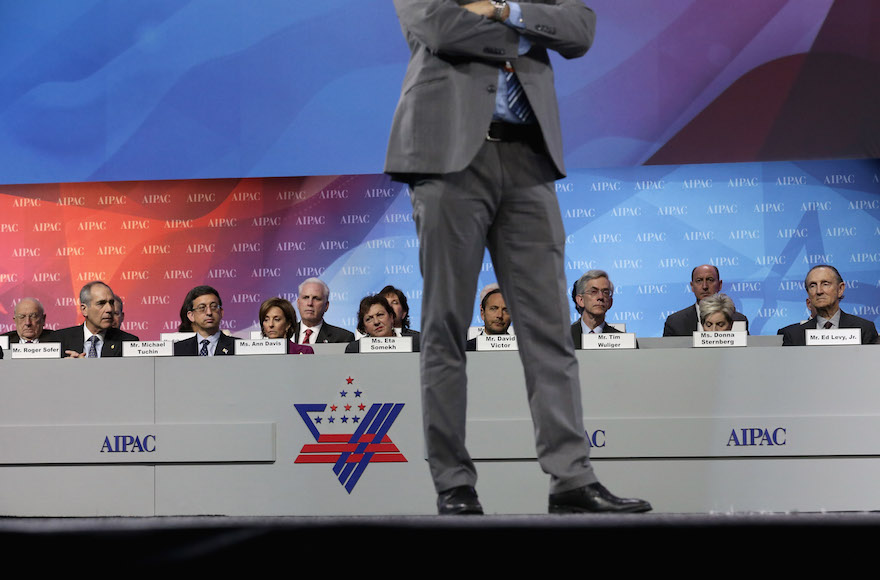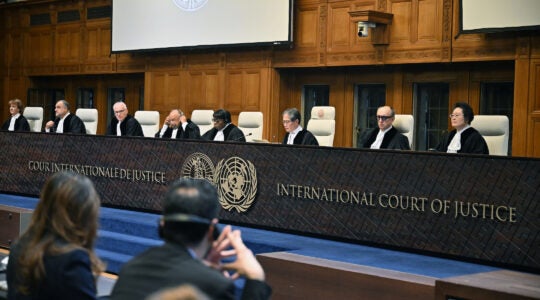WASHINGTON (JTA) – Here are five things to watch for at this year’s annual conference of the American Israel Public Affairs Committee, which is taking place here March 19-22:
It’s Yoooooooooge.
Organizers are expecting 18,000 activists, 3,000 more than last year, the largest number ever.
So large, for the first time, plenary sessions are moving out of the Washington Convention Center to the Verizon Center, a sports arena a few blocks away.
Factors fueling interest: The perception that the Boycott, Divestment and Sanctions movement against Israel is making inroads; the unhappiness among AIPAC activists with the Iran nuclear deal; and the election season – the chance to see presidential candidates make their case to the pro-Israel crowd.
Forget the kosher dinner statistics – AIPAC’s not even going to go there, serving no mass dinner this year. But for the first time all food stands within the convention center are kosher only.
READ: Leaders of Jewish right and left face off in revealing Las Vegas debate
What will Donald say?
Donald Trump, the Republican front-runner, will address the conference. His three rivals for the party’s presidential nomination — Sens. Ted Cruz, R-Texas, and Marco Rubio, R-Fla., and Ohio Gov. John Kasich — are more firmly in the pro-Israel camp but are less likely to attend (although watch for video messages) because they are out on the trail, struggling to catch up with him.
AIPAC insiders are looking for two things from Trump: a repudiation once and for all of his pledge of neutrality when it comes to Israeli-Palestinian peacemaking, and a more substantive outline of his plans for the U.S.-Israel relationship. Boasts about his Jewish grandkids and his 2004 appearance as a grand marshal at a Salute to Israel Parade in New York City just ain’t gonna cut it.
The Reform movement leadership has promised to “engage” with Trump over what it calls his “hate speech” targeting Mexicans and Muslims, among others. What does that mean? I asked Lauren Theodore, the Union for Reform Judaism’s spokeswoman, and she basically told me to wait and see.
READ: Israel emerges as campaign issue ahead of voting in 3 big Jewish states
How will Hillary say it?
Hillary Clinton has plenty of goodwill shored up in the AIPAC precincts of the pro-Israel community stemming from her days as the senator from New York, when she routinely appeared at conferences on Tuesday morning firing up believers before they headed to Capitol Hill. She was the first of the candidates to confirm her appearance.
She’s been running a presidential campaign, however, that casts her in every way as the second incarnation of Barack Obama – a way of distinguishing Clinton from her surprisingly resilient Democratic rival, Sen. Bernie Sanders, I-Vt., who has criticized Obama on domestic policies, particularly regarding the financial sector.
Obama II won’t play well with this crowd. Prior to the launch of the actual primaries, Clinton was more willing to distance herself from Obama, in subtle ways, on pro-Israel issues. She thought it was a mistake to make settlements such a charged issue, for instance, in Obama’s first term, when she was secretary of state. Clinton simultaneously takes credit for helping to shape the Iran nuclear deal, but also has suggested she would implement it with greater skepticism than the current administration.
Does she risk losing the Obama-loving primary voters who have kept her well ahead of Sanders in order to pivot back toward AIPAC?
Does Bernie Sanders say anything?
AIPAC has invited all contenders, but as noted above, Trump’s three Republican rivals likely will not show because they will be working hard to catch up in Arizona, Utah and Idaho, which go to the polls on March 22.
Democrats in Arizona and Utah also vote next week, and it’s not yet clear if Sanders would rather be working those states to the max or facing off against Hillary at AIPAC.
What kind of reception should Sanders expect? A polite one, according to folks I’ve spoken with. Enthusiastic? Well …
Sanders hews closer to Trump than to Clinton or any of the other Republicans on Israeli-Palestinian peacemaking, telling Arab Americans recently that he would “level” the playing field among Arabs and Israelis when it comes to U.S. mediation, and counting J Street and the Arab American Institute among go-to outlets for Middle East policy advice. He also not only endorses the Iran deal, he wants to launch “normalization” with the country. There’s a petition from AIPAC critics calling on him not to speak.
On the other hand, Sanders is also the first Jewish presidential candidate to win primary contests, and over the years he has routinely made the “roll call,” the Monday night highlight when AIPAC lay and professional leaders list all the lawmakers showing up at the conference. AIPAC activists in Vermont say he gives them a fair hearing, and the video of Sanders shouting down pro-Palestinian activists at a 2014 town hall meeting in Cabot, Vermont, has become iconic in pro-Israel circles.
READ: The Jewish Bernie Sanders only Vermonters know
We love Democrats! Honestly, we do! But let’s talk Iran.
AIPAC suffered a painful split with much of the Democratic caucus last year over the Iran nuclear deal. The day it was clear that Democrats in the Senate would block a vote on whether to scotch the deal, there were emotional scenes in congressional offices.
AIPAC insiders insist that’s behind them. Democrats in Congress have been pushing hard on comity, particularly when it comes to bipartisan legislation targeting BDS and in increasing military assistance to Israel.
Except: Until late last week, the only Democrats in Congress who were slated to appear were from among the minority (28 in the House and four in the Senate) who opposed the Iran deal. On Thursday, a single Iran deal backer, Rep. Steny Hoyer, D-Md., the minority whip in the House, said he would appear, presumably to reprise his annual pro-Israel version of Punch and Judy in which he and a top Republican disagree on just about anything except the US.-Israel alliance.
That’s one pro-deal lawmaker, two if you count Vice President Joe Biden, who casts tiebreakers in the Senate, and three if Bernie Sanders speaks. Missing from the roster – at least of this writing – are past regulars such as Reps. Nancy Pelosi, D-Calif., the minority leader; Debbie Wasserman Schultz, D-Fla., the chairwoman of the Democratic National Committee; Jerry Nadler, D-N.Y., who claims to have the largest Jewish constituency in the county; and Elijah Cummings, D-Md., who established a program that sends a dozen leading African-American students in his Baltimore area district each year to bolster ties between African Americans and Israel.
No one is saying who was invited and declined and who simply was not invited. But the Iran tensions are not about to dissipate. The Obama administration has made it clear that the deal is done, and it will not look kindly on attempts to upend it – an outlook that Israeli Prime Minister Benjamin Netanyahu has respected, which accounts for some of the goodwill that has accrued between the two leaders since last year.
For AIPAC, it’s not so clear. An official said the lobby would support the reauthorization of the Iran Sanctions Act and other sanctions bills, but had yet to settle on specific bills they would back. There are multiple bills under consideration. Some would leave wiggle room for the president to ignore provisions, others seek to force his hand and suspend the agreement. Which does AIPAC back? Even Democrats who last year opposed the deal now say it’s time to move on and live with the it, while placing the agreement under intense scrutiny.
READ: Inside the final throes of the Iran deal battle: Hugs, pink kaleidoscopes and Trump
Also on the agenda:
— Netanyahu will speak via live video link. He opted not to attend in person, not wanting to be caught up in a divisive election.
— AIPAC, an official told JTA, will back renewing the U.S.-Israel defense assistance memorandum of understanding, which must be done by 2018. Specifics, though, are sparse. The Obama administration reportedly wants to bring funding up from $3 billion to $4 billion annually, while Netanyahu is holding out for an amount closer to $5 billion, saying Israel needs a boost in the post-Iran deal environment.
— Also, the AIPAC official told me, expect backing for congressional action condemning any bid by the Palestinians to seek statehood recognition outside the framework of negotiations. That includes demands for a continued U.S. veto of any bids through the U.N. Security Council.
JTA has documented Jewish history in real-time for over a century. Keep our journalism strong by joining us in supporting independent, award-winning reporting.






